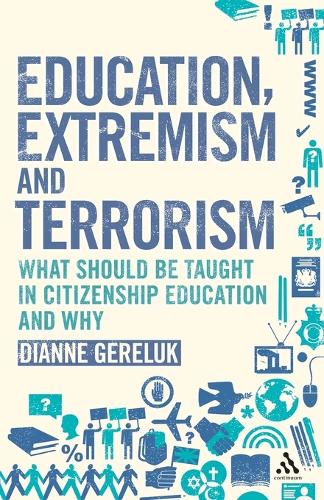
Education, Extremism and Terrorism: What Should be Taught in Citizenship Education and Why
(Paperback)
Available Formats
Publishing Details
Education, Extremism and Terrorism: What Should be Taught in Citizenship Education and Why
By (Author) Dr Dianne Gereluk
Continuum Publishing Corporation
Continuum Publishing Corporation
8th March 2012
United States
Classifications
Tertiary Education
Non Fiction
Teaching of a specific subject
Educational: Citizenship and social education
370.115
Physical Properties
Paperback
160
Width 138mm, Height 216mm
232g
Description
The terrorist attacks in the USA and UK on 9/11 and 7/7, and subsequent media coverage, have resulted in a heightened awareness of extremists and terrorists. Should educators be exploring terrorism and extremism within their classrooms If so, what should they be teaching, and how Dianne Gereluk draws together the diverging opinions surrounding these debates, exploring and critiquing the justifications used for why these issues should be addressed in schools. She goes on to consider the ways in which educators should teach these topics, providing practical suggestions. Education, Extremism and Terrorism is essential reading for undergraduate and postgraduate education students looking to engage with the philosophical, sociological and political issues that are central to this debate.
Reviews
Dianne Gereluk provides a comprehensive and daring look at the pressing issue of teaching about terrorism and extremism in schools. Rich in direct discussion of classroom practices and offering a clear analysis of the principles that should guide them, this book is sensitive both to the realities of teaching and to the demands of democracy. Gereluk advocates situating teaching on terrorism and extremism within a larger moral framework, one that corresponds with democratic and political values. This book provides a much needed resource to administrators and teachers who are struggling with the changing faces of war and their educational implications. Sigal Ben-Porath, Associate Professor, Graduate School of Education, University of Pennsylvania, USA
In this thought-provoking book, Dianne Gereluk challenges teachers' understandable reluctance to address topics like terrorism and extremism in schools. She argues persuasively for robust, balanced, reasonable teaching about these issues, and encourages teachers to reflect seriously on underlying principles including the nature of knowledge, the promotion of values and the teaching of controversial issues. This book is essential reading for anyone with an interest in citizenship and education.' J. Mark Halstead, Emeritus Professor of Education, University of Huddersfield, UK
Dianne Gereluk has written an engaging and thoughtful book. It is important to read if you are interested in better understanding how to navigate some of the most challenging controversies and dilemmas that arise when teaching about terrorism and extremism in the post 9/11 and 7/7 US and UK. By comparing the political contexts and curriculum about terrorism from the two nations, she demonstrates vividly that it can be challenging to teach this content with integrity. But she also makes a strong case for why teachers should not shy away from the challenge.' Diana Hess, Senior Vice President of the Spencer Foundation and Professor of Curriculum and Instruction, University of Wisconsin-Madison, USA
[T]his book sets us up nicely to start a long-overdue discussion. It hits many of central issues in an engaging way, free of paranoia or bluster. Each chapter includes interludes where discussion questions are posed. Clearly, the purpose of the book is not to answer every question about terrorism and education, but to start a more meaningful educational engagement with the issue. In this task, the book succeeds admirably...Dianne Gereluk, I believe, has done us a service in initiating a more intelligent discussion of how and why terrorism should be a topic in 21st century schools. I hope that the discussion can continue. -- Bryan R. Warnick * Education Review/Reseas Educativas *
Author Bio
Dianne Gereluk is Associate Professor in Policy and Leadership Studies at the University of Calgary, Canada, and Senior Research Fellow at Roehampton University, UK. Her research currently examines the parameters of parents' ability to decide the extent to which their children are exposed to and taught about controversial issues in schools. Dianne is also author of Education and Community (Continuum 2006), and Symbolic Clothing in Schools (Continuum 2008).
